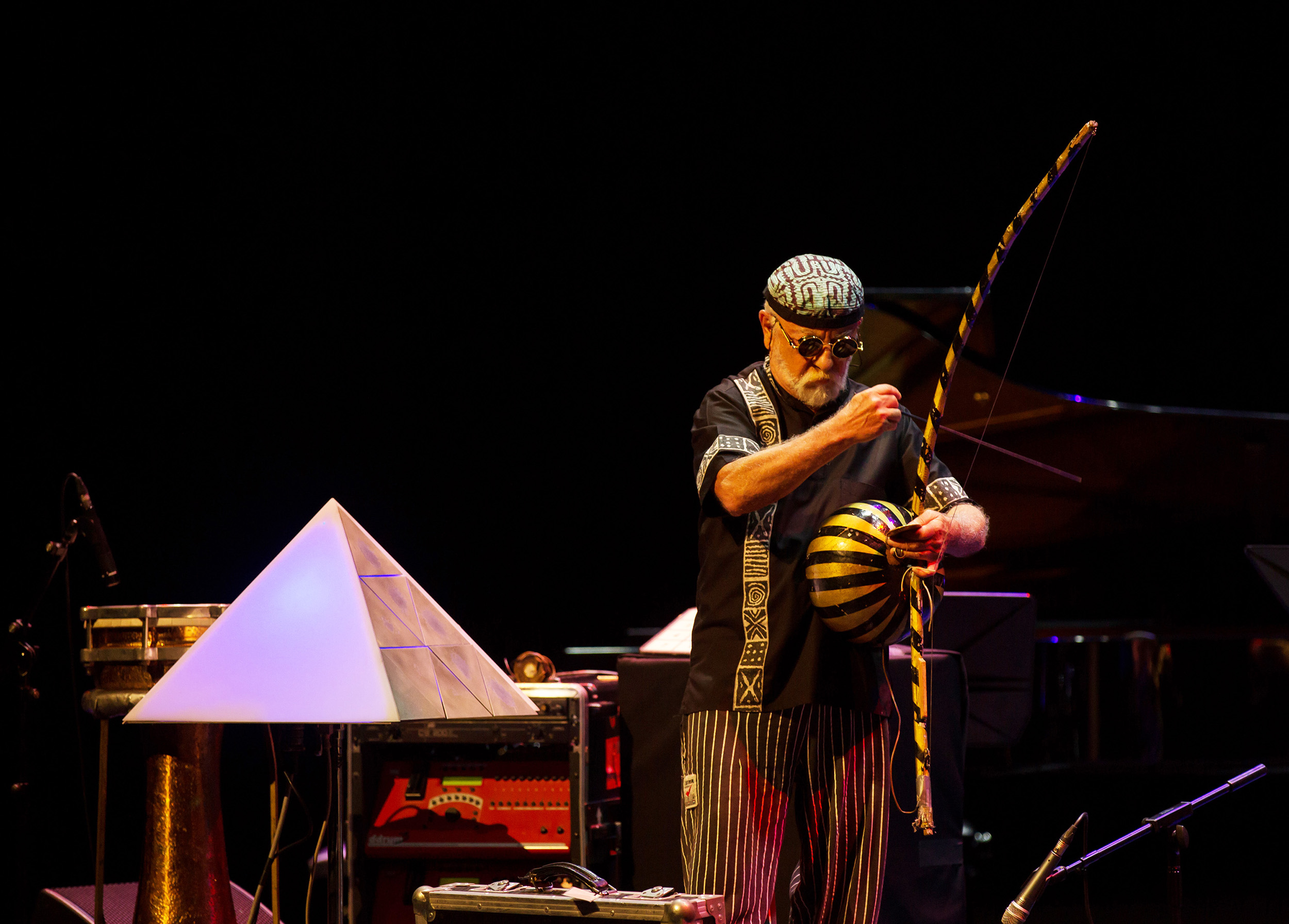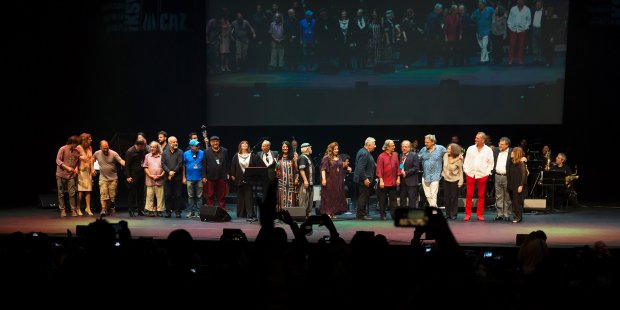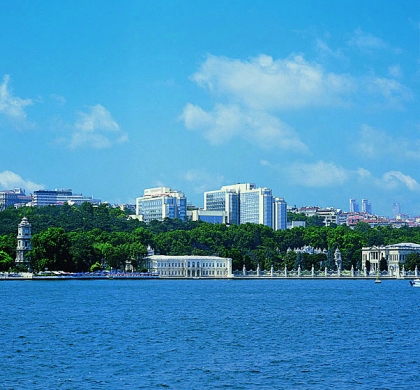The Opening Concert of the İKSV İstanbul Jazz Festival – sponsored by Garanti Bank – took place at the Zorlu Center on Tuesday (June 26). The theme was ‘Turkish Jazz through the Generations on the 25th Anniversary of the Festival’, and the occasion provided your reviewer – who knew very little about the subject – with a useful overview of the development of jazz in Turkey since the 1960s.
But before going into detail with this particular event I'll take the opportunity to mark the reader’s card with a few pointers as to the highlights to come (make sure to use purple ink when circling these dates in your psychedelic diaries). The biggest name among various stars gracing the currently storm-clouded İstanbul firmament is probably Zakir Hussain, the world-famous tabla-player. He will be performing – with double-bassist Dave Holland and saxophonist Chris Potter – as a member of the Cross Currents Trio on June 29 in the Ana Tiyatro (‘Main Theatre’) of the Zorlu PSM (‘Performans Sanatları Merkezi’) in Zincirlikuyu.
Your reviewer will not be attending this gig as he intends to be present at two planned for the following week. The first of these is to be given by the Fabrizio Bosso Quartet and the Massimo Manzi Trio (with the Turkish singer Elif Çağlar) on July 2 in the garden of the Venedik Sarayı (the Palazzo di Venezia) in Beyoğlu, a building I believe was originally constructed to house the Ambassador to the Sublime Porte of the Serene Republic of Venice and is now home to the Italian consulate-general. This super-cool pad has not always been in Italian hands, however. Owing to the ups and downs in Italy’s fortunes, it has at various times been the hanging-out space of the ambassadors of France (following the capture of Venice by Napoleon in 1797) and the premises of the Austrian embassy (after the 1815 Treaty of Vienna). It became the residence of the Italian ambassador only in 1866, the date on which Venice joined the newly unified state of Italy.
I have to admit that part of my motive for wishing to be entertained in the grounds of this imposing edifice is curiosity as to what the view from it might offer. I certainly hope it will be worth the risk of getting soaked in the cloudbursts currently providing İstanbul residents with meteorological distraction. One word of warning: reservations must be made well in advance for this concert as security is understandably tight. Online bookings should be made as soon as possible via the Biletix website. And be sure to click on 'Please Note' under the individual concert entries – seperate reservations in addition to tickets are required and you need id when you attend: the reservation form is here)
On the following day (July 3) I shall – İnşallah – be witnessing Avishai Cohen's performance in the Sultan Park at Swissôtel The Bosphorus. Raincoats may be de rigueur, but I will no doubt shrug off the squalls with well-practised Mancunian fortitude. Mr Cohen, who is best known as a double-bassist but has several other rather remarkable strings to his fiddle, will be playing numbers from his recent album, 1970.
Other events that might deserve a syncopated asterisk in your pocket organiser are as follows:
❀ Selen Gülün in Kadınlar Matinesi (‘Women’s Matinée’), which brings an all-female line-up to the Zorlu PSM on June 29.
❀ The Erkan Oğur Quartet and the Shahin Novrasli Trio at the Sakıp Sabancı Museum in Emirgan on June 30. Watch out for Shahin Novrasli’s sensitive pianism, to be followed by Erkan Oğur’s fearlessly fretless guitar-playing.
❀ R+R=NOW, Robert Glasper’s new band; he and friends will be playing jazz-infused R&B and hip hop at the UNIQ Açık Hava Sahnesi (Open-Air Stage) in Ayazağa Caddesi, Maslak on July 6.
❀ Anat Cohen (clarinet) and Marcello Gonçalves (guitar), a duo with a Brazilian flavour due to perform on July 9 at the Zorlu PSM Drama Sahnesi.
❀ Omar Sosa and Yilian Cañizares at the Marmara Esma Sultan Yalısı, next to the Ortaköy Mosque, on July 9. African and Cuban influences may be expected to come to the fore.
❀ Nick Cave and the Bad Seeds, preceded by Lara di Lara. The venue for this event on July 10 will be Küçükçiftlik Park (in the hollow that dips down to the Bosphorus between Taksim and Nişantaşı).
❀ The Julian Lage Trio at 7pm (note the time!) on July 11 at the Zorlu PSM Drama Sahnesi. Mr Lage, a virtuoso guitarist, is a former child prodigy who was featured in the documentary Jules at Eight in 1997.
❀ The Fred Hersch Trio, also at the Zorlu PSM Drama Sahnesi on July 11. Tthe performance of this adventurous pianist and his group starts at 9.30pm (ie straight after Julian Lage).
❀ The Parisien / Peirani / Schaerer / Wollny Quartet will be playing the whole of their album Out of Land at the Zorlu PSM Drama Sahnesi on July 11.
❀ Robert Plant and the Sensational Space Shifters. Mr Plant, formerly lead singer of Led Zeppelin, will be performing with his group at the Cemil Topuzlu Açık Hava Sahnesi (‘Open-Air Stage’) in Harbiye on July 17.
My apologies to the many fine musicians who have been left out of this list, and to their fans – no offence intended. Also, I must sound a warning note with regard to the accuracy of the above information, which is taken from the festival booklet. Prospective concertgoers are advised to check the details with the İKSV Jazz Festival website.
And so we return to the Opening Concert on June 26. The event began with the presentation of Lifetime Achievement Awards to the double-bassist Nezih Yeşilnil (who later gave a performance with his wife, the painter and singer Ayşegül Yeşilnil), to the harmonica-player Ahmet Faik Şener, and to the pianist Şevket Uğurluer. Mr Uğurluer, who founded his own orchestra in 1961, is a familiar figure in Turkey by virtue of the fact that he hosted Anılarla Müzik (‘Music with Memories’), which ran for 20 years on the TRT.
While Messrs Yeşilnil and Uğurluer both seemed to be in good health (touch wood), Mr Şener – born in 1927 – walked onto the stage with difficulty. Known by his nickname Balarısı Ahmet (‘Honeybee Ahmet’), he was a firm favourite with Turkish audiences of yesteryear. In the first of two videos that follow he plays a melody from Turkish classical music; in the second a tune called ‘Rüzgar Uyumuş’ (‘The Wind Has Fallen Asleep’):
Following the awards, the male presenter invited the audience to film the performances that were to follow on their telephones – an invitation that was readily accepted. His female co-presenter then gave us a short description of Caz Sanatı (‘The Art of Jazz’, 1958), a work by İlhan Mimaroğlu that was apparently the first book on jazz to be published in Turkey. The writer Zeynep Oral says she takes her copy to every jazz concert she goes to. For those who read Turkish, here is a link to her article on the subject.
Then the music began. First onstage was Tuna Ötenel. Now unable to use his left hand as a result of a stroke, he walks, very haltingly, with the aid of a stick. Mr Ötenel sat in an armchair to play us a tune on the cornet, accompanied on piano by the celebrated composer and arranger Emin Fındıkoğlu, with Volkan Hürsever on double bass and Ateş Tezer on drums. He then played a little something on the piano with his right hand. It was a most touching occasion. Tuna Ötenel is an important figure in Turkish jazz, having been not only an extremely fine musician in his own right but also a teacher of jazz piano at Bilgi University in the days when this institution had a jazz department in its music faculty. He was in fact the teacher of Çağrı Sertel, whose group’s performance your reviewer attended the day after the opening concert (more of this in my next blog).
It seems that in 1933 Mr Ötenel’s father, though essentially a violinist, came to İstanbul from Bulgaria as the goalkeeper of a football team. After the match he sought political asylum and eventually took Turkish citizenship. When he went to collect his identity card, a process which involved choosing a Turkish surname, from the Nüfus Müdürlüğü (‘Population Directorate’), he entered the office holding his violin – which the clerk on duty promptly asked him to play. The impression he made was so strong that the clerk told him he ought to take the surname ‘Ötenel’, meaning ‘Singing Hand’.
In 1959 his son Tuna, though only 12 years of age, was admitted to the Ankara State Conservatoire by reason of his exceptional musical ability. There he took lessons from the celebrated composer Ulvi Cemal Erkin. At the age of 15, however, he was expelled for the crime of playing jazz. (It is worth noting that in later years the pianist and arranger Genco Arı, a jazz musician of truly international standard, suffered the same fate at the İstanbul State Conservatoire. I am at a loss to understand why these institutions should have behaved so irrationally, doing their best to nip their country’s major talents in the bud.)
Here is ‘Ali’yi Gördüm Ali’yi’, from Caz Semai, a seminal album in the history of Turkish jazz. All the tracks are compositions by Ötenel, who plays both the piano and the saxophone. Caz Semai was recorded in 1978 with the drummer Erol Pekcan and the bass guitarist Kudret Öztoprak (both of whom are unfortunately no longer with us):
And now, two videos of Tuna Ötenel’s more recent performances. In the first he accompanies the singer Sibel Köse – again on both the piano and the saxophone – in 2007, the year before his health broke down:
In the second, he is playing the piano in ‘Autumn Leaves’, this time with Ülkü Aybala Sunat:
It is worth investigating all the Tuna Ötenel recordings you can find on YouTube. You will not be disappointed.
The opening concert continued with performances by a number of famous jazz musicians, including drummer Ateş Tezer, pianist and arranger Ayşe Tütüncü, guitarists Neşet Ruacan and Önder Foçan, pianist Nilüfer Verdi, trumpeter and flugelhorn-player Şenova Ülker and double-bassist Volkan Hürsever – to name but a few. Once more, my apologies to the many names who have been missed out of this list purely for the sake of brevity.

Last, but certainly not least, I must mention a memorable performance by Okay Temiz, a highly inventive musician who celebrated his 80th birthday earlier this year (photographed above by Fatih Küçük). He played a number of strange and wonderful instruments including a pyramid that produced different sounds, some of them Balinese in timbre, wherever he touched it, and a device like a longbow with a single string (which he played with an ordinary violin bow). Here is a video of him in a piece called ‘Dokuz Sekiz’ (‘Nine Eight’):
Three important figures who might have given enjoyable solos during this ‘march-past’ of celebrated Turkish jazzmen and women were the pianist Ali Perret, once upon a time both a teacher and an administrator in the jazz department at the music faculty of Bilgi University; his fellow-pianist Aydın Esen, another highly accomplished representative of what is new in Turkish jazz; and the saxophonist Engin Recepoğulları. I was, however, able to listen to this latter musician the next day, when he played with Çağrı Sertel and his group. He was a wow – as indeed they all were.
Following this medley of famous names, three jazz musicians who had passed away since last year’s festival were honoured. These were the trombone player Elvan Aracı, the guitarist Cem Bumin, and the bass guitarist, jazz teacher and music critic Cüneyt Sermet (father of the pianist Hüseyin Sermet). Here is a video of the late Elvan Aracı playing both the trombone and the piano in ‘Blues Walk’:
I feel duty bound to record the fact that the aforementioned medley went on too long, and included acts that were not strictly up to professional standards. It would have been kinder to the musicians concerned to show the audience short videos of their performances in their heydays 20 or so years ago rather than have them actually sing or play. It would certainly have been kinder to the audience.
Things looked up considerably when the TRT Hafif Müzik ve Caz Orkestrası (otherwise known as the ‘TRT Big Band’) took the stage under the direction of their conductor, Kamil Özler. The first musician they accompanied in a solo was the trumpeter İmer Demirer, himself a member of the orchestra. Mr Demirer is one of the finest jazz musicians in the country, and his performance very much lived up to expectations. Here are three YouTube videos of his superb playing. First, a piece called ‘Railroad’ (his own composition):
Now, ‘Chesney’:
And finally, a performance of ‘Blues by Five’ by the İmer Demirer Quintet:
The next soloist to be accompanied by the Big Band was Neşet Ruacan, whose lightning-speed guitar-playing gave the audience a good deal of pleasure. Following this, we heard the singer Sibel Köse, a Turkish jazz musician of supreme professionalism and flawless taste. Here she is once more (you have already heard her sing with Tuna Ötenel, who accompanies her here as well) in ‘I’ve Got the World on a String’:
And now, here is the Sibel Köse Quintet performing at Turkish Jazz Week in Kosovo:
I highly recommend that you listen to everything by her that is available on YouTube: she truly is exceptional.
Next on the programme was Ayşe Gencer (the spouse of İmer Demirer). Again, the quality was palpable. Here she is in ‘But Beautiful’:
Lastly, we listened to İlham Gencer, father of the previous performer. This man, a ‘golden oldie’ born in 1925, still looks remarkably spry and dapper despite his advanced age. Although he is also a pianist, on this occasion he proved his mettle as a singer, and his rousing performance (in Turkish, French and English) made a fitting end to a celebration of the famous names in Turkish jazz throughout its history.
It can only be a good thing to pay tribute to the many fine jazz musicians who have entertained Turkish people – and, in certain cases, those in other countries too – over the past 50 or 60 years. That said, I think the festival organisers might well come to the conclusion that apart from the distribution of Lifetime Achievement Awards to suitable candidates and the showcasing of indisputably important figures such as Tuna Ötenel, it is now time to draw a line under invitations to perform in cases where quality has suffered with the passage of time. Nevertheless, the Opening Concert of the 25th İKSV İstanbul Jazz Festival gave your reviewer an excellent overview of the historical dimension of Turkish jazz, and this was much appreciated. And come to think of it, some of the numbers weren’t at all bad.
















